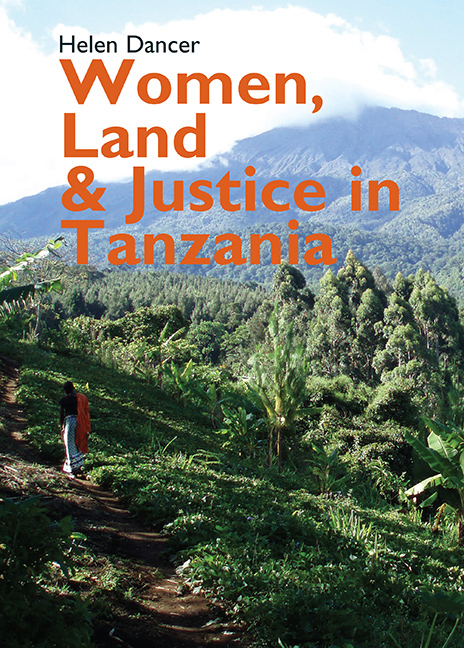Book contents
- Frontmatter
- Dedication
- Contents
- Acknowledgements
- Glossary of Kiswahili and Vernacular Words
- List of Abbreviations and Acronyms
- Table of Legislation
- Table of Cases
- Introduction
- 1 Social Origins of Women’s Claims to Land: Gender, Family and Land Tenure in Arusha
- 2 Women’s Claims to Land in Tanzania’s Statutory Framework
- 3 Making Legal Claims to Land: Agency, Power Relations and Access to Justice
- 4 Doing Justice in Women’s Claims: Haki and Equal Rights
- 5 ‘Shamba ni langu’ (The shamba is mine): A Case Study of Gender, Power and Law in Action
- Conclusion
- Appendix – Case reports
- Bibliography
- Index
- Eastern African Studies
- Frontmatter
- Dedication
- Contents
- Acknowledgements
- Glossary of Kiswahili and Vernacular Words
- List of Abbreviations and Acronyms
- Table of Legislation
- Table of Cases
- Introduction
- 1 Social Origins of Women’s Claims to Land: Gender, Family and Land Tenure in Arusha
- 2 Women’s Claims to Land in Tanzania’s Statutory Framework
- 3 Making Legal Claims to Land: Agency, Power Relations and Access to Justice
- 4 Doing Justice in Women’s Claims: Haki and Equal Rights
- 5 ‘Shamba ni langu’ (The shamba is mine): A Case Study of Gender, Power and Law in Action
- Conclusion
- Appendix – Case reports
- Bibliography
- Index
- Eastern African Studies
Summary
Mimi naomba mtoto wa kike hana urithi kwani baba yangu alishanipa … naomba haki itendeke. (I ask why a daughter cannot inherit, because my father gave me [that land] … I ask that justice be done)
Concluding words from a woman litigant's statement to a ward tribunal, Arusha 2009When I began researching women's legal claims to land in Tanzania, it was from the perspective of a practising lawyer, with a belief that human rights could serve as a legal tool to challenge inequality and realise women's interests in land. At the outset I was heavily influenced by the discourses of international human rights law and my own positivist legal training. Yet the feminist postcolonial critiques of human rights I encountered challenged me to think about human rights in a different way, to the extent that I chose not to pursue a so-called ‘rights-based approach’ to my fieldwork. Instead, women's experiences of law and legal processes became my starting point for researching law in action. When I encountered the language of rights in practice, it had a different moral ‘feel’ from the rights-based discourses of law and policy-making. Reflecting on the ways in which people engage with law and ideas of rights in practice, I have returned to my original belief in the value of human rights for individual empowerment. However, in the light of the lessons learned from women's experiences of engaging with the Tanzanian legal system, and my own experiences as a lawyer in England, my perspective on how individuals can and could realise their interests in land using law and human rights has shifted considerably.
Using international human rights law as a starting-point for ‘rightsbased approaches’ to legal empowerment at a national level generally involves adopting a framework of rights-speak that is legalistic, technical and ultimately delimited by the interests of the state. Within this framework, although rights may become ‘vernacularised’ at a local level, to use Merry's (2006) phrase, they nonetheless retain a hegemonic essence. Although legalistic human rights represent a legal tool, their origins as state instruments mean that they lack the characteristic humanity and felt sense of justice which flow most naturally from ‘counter-hegemonic’ people-driven notions of rights – as Santos (2007; 2009) conceptualises them.
- Type
- Chapter
- Information
- Women, Land and Justice in Tanzania , pp. 147 - 160Publisher: Boydell & BrewerPrint publication year: 2015

